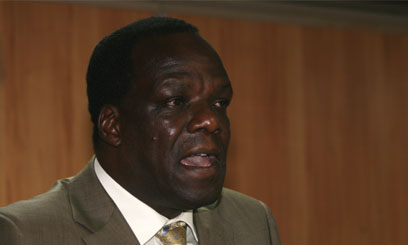
Oparanya noted that failure to attain the 10 percent GDP growth this year as stipulated in the First MTP was largely due to the 2008 PEV/FILE
Planning Minister Wycliffe Oparanya noted that failure to attain the 10 percent Gross Domestic Product (GDP) growth this year as stipulated in the First Medium Term Plan (MTP) was largely due to the 2008 post election violence.
The Ministry of State for Planning, National Development and Vision 2030 launched the Sector Working Groups of the Second Medium Term Plan (MTP), as they aim to build on the development witnessed under the First MTP by adapting to the emerging resources in Kenya’s economy, the new Constitution and issues dealing with climate change.
“The relevant sector working group being launched here today include devolution, agriculture, infrastructure, tourism, wholesale, retail trade, manufacturing, ICT, BPO, financial services, health, education, science, technology, environment, water and sanitation, urbanization and public sector reforms among others,” Oparanya said.
“We need to maintain an open-minded attitude with each other as we cooperate between the two levels of government in the planning process and we must learn to use the facilities provided under the Transition to Devolved Governments Act to ensure coordination at the two levels of government,” he added.
The Second MTP will be launched in June 2013 following the expiration of the First MTP and Oparanya announced that they will engage in consultation with communities at the national and county levels to ensure that the two levels of government cooperate harmoniously to minimise litigation through a consultative process.
He emphasised the importance of starting the Second MTP with in-depth consultations by the local and national government.
“Through these forums we expect not just constructive criticism, but also constructive policy alternatives from communities, businesses, professional groups and civil societies,” he said.
The First MTP Plan was launched in unison with Kenya’s long term development blueprint “Vision 2030” in June 2008 with the goal of having Kenya become “a middle income, rapidly industrializing country offering a high quality of life to all its citizens in a clean and secure environment.”
Assistant Planning Minister Peter Kenneth acknowledged that they experienced many successes and challenges during the First MTP, and he emphasised that the country must learn from the last four years if they want to see continued expansion in various sectors of the economy.
“The basis of the next MTP must be on economic growth and certain factors must be present for any economic growth,” he said.
“We must have investments, exports and production. Therefore, as we look at the Second MTP, we must put our energies on economic growth and look at sectors that will help us achieve 10 percent GDP growth,” he explained.
During the First MTP, the country faced huge challenges in generation of quality jobs for unemployed youth, institutional inefficiencies, food security, inadequate absorptive capacity of development funds, vulnerability to climate change and adversities from the global economy.
“We need to plan for climate change and the building of our internal resilience in response to shocks originating from unexpected changes in weather, such as drought and floods,” he said.
“This will be the first time that a Kenya national development plan has taken climate change resilience as an enabler across all the economic sectors,” he revealed.
Kenneth announced that the Ministry of State for Planning, National Development and Vision 2030 is collaborating in this effort with the Ministry for Environment, Natural Resources and Minerals.
“One of the side benefits from this effort is that in collaboration with the Ministry of Finance, this Ministry and the Kenya Government will be in a better position to claim carbon credits than before,” he explained.
The purchase and sale of carbon credits are relatively new concepts in Africa, accounting for less than three percent of the $144 billion (Sh12.08 trillion) global carbon credit trade and so far Kenya earned has Sh534 million from carbon trading.
The system is designed to reduce carbon emissions worldwide by allowing projects that that produce low carbon emissions to sell credits to projects that want to reduce their carbon emissions under the Kyoto Protocol, and in developing countries, one gets credited to the extent to which one is emitting less carbon as per the standards fixed by the United Nations Framework Convention on Climate Change.
Kenneth cautioned the ministry against spreading itself too thin and he advised the sector working groups to target investments in key projects which have transformational impacts, add value and diversify Kenya’s economic base and exports so as to enhance the country’s competitiveness in the global market.
“To ensure sustainable development, sector working groups must mainstream strategies to achieve a ‘green growth’ as opposed to a ‘brown growth’ and we must ensure that innovation becomes the spinal cord of the second MTP,” he stated.
“For economic growth to be transformational, it must create employment through the increase of investments that provide both direct and indirect contribution to employment creation,” he explained.
He noted that due to the 2008 post-election violence, the ministry has made it a priority to integrate peace and security into the planning process.
“We have MTP Sectors on ‘Security, Peace Building and Conflict Resolution’ and ‘Governance, Justice and the Rule of Law’ and we hope that there will be better harmonization between the annual budget and the MTP in the peace and security sector by streamlining the activities between the sector groups in planning and finance,” he said.
“We also intend to integrate human rights, gender and the economic and social rights guaranteed to Kenya under the constitution,” he added.
Kenneth added that they plan to work with the devolved government, making sure to recognize the functions of the county and national governments as spelt out under Schedule Four of the Constitution.
“We will respect that division of labour, and under it, counties will still retain their right to plan as stated in the County Governments Act of 2012 and the Transition to Devolved Government Act of 2012,” he said.


































